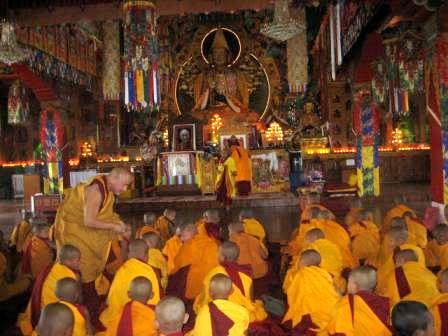 |
In 1973 His Holiness the Dalai Lama wrote the "Direct Instruction From Shakyamuni Buddha -- A Gelong's Training in Brief", a vinaya text based on the Interleaved Summaries presenting the fully ordained monk's vows. In this commentary His Holiness comments on the 253 vows of a fully ordained monk according to the Mulasarvativadin school of Vinaya. His Holiness the Dalai Lama feels that it is important to know that nuns and monks ordained in the Tibetan tradition follow the vows set forth in the Mulasarvastivadin school of monastic codes. The gelong/gelongma (bhikshu/bhikshuni--the fully ordained monk/nun) level are recorded in the Mulasarvastivadin school's Individual Liberation Sutras. Interspersed throughout their Tibetan translation is an easy to remember set of chantable verses summarizing the gelong or gelongma vows. These versified mnemonics are known as the "Interleaved Summaries of the Vinaya Discourse".
Mulasarvativadin school of Vinaya was brought to Tibet by the Indian Abbot Shantarakshita in the 8th century, who visited there at the invitation of the Tibetan Monarch Trisong Deutsan. At the request of the Tibetans he founded the first monastic community by first ordaining seven young and promising Tibetans. Gradually more monks were ordained by him, thereby establishing the Buddhist monastic order of the Mulasarvastivadin system in Tibet. We are now in the 2554th year since the Buddha passed away beyond sorrow. Ever since the Buddhist monastic lineage of this tradition was established in Tibet it has continued unbroken despite great difficulties in the century following Udum Tsanpo's persecution of Buddhist monastics and Buddhists during his reign.
The getsuls/getsulmas (novice monks and nuns) keep vows similar to the fully ordained monks. All the eight different pratimoksha vows are meant for a whole life from and not just a part of one's life, except for the one-day fasting upavasa vows. Therefore, the motivation must be for the rest of one's life while taking the getsul, getsulma, and gelong ordinations.
Abbreviated Text taken from http://www.dalailama.com/messages/buddhism/ordination-in-the-tibetan-tradition

